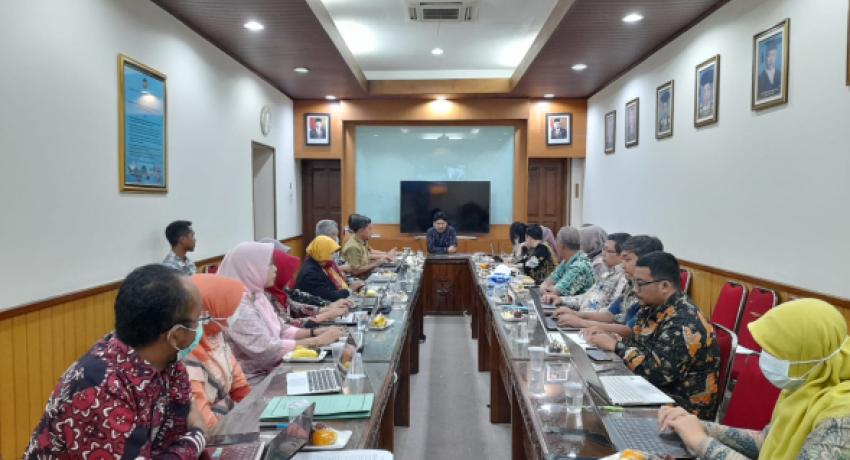The Ministry of Rural Development conducted a forum group discussion with UNY at the Rectorate Thursday (9/3). Present on this occasion were Prof. Yoyon Suryono (Expert Staff of the Ministry of Village PDTT) accompanied by Agus Kuncoro, S.Sos., M.Si (Head of Policy Development Center for Village Development, Disadvantaged Regions and Transmigration), Jaenudin, S.Sos., M.Si (Junior Expert Policy Analyst - Head of Village Community Development Working Team), Novita Riani, S.Pi., M.Si (Junior Expert Policy Analyst), Adawiya Taufani (Village Community Development Working Team), Hafifah Aninadia (Village Community Development Working Team) and Agits Agnia (DDTT Policy Development Center Staff).
In his remarks, Yoyon Suryono said that the first implementer of the RPL program was actually UNY and already had a good concept where the task of the PDTT Ministry of Villages was to realize village development. "The question is whether RPL Desa can support the implementation of village tasks. Does the RPL increase the education level of village activists? And how is the realization? This requires data related to the implementation of the RPL to become the Minister's material that RPL has a positive impact and must be sustainable, "said Yoyon. The increase in the acceleration of village development is influenced by one of the village's human resources. It is recognized that RPL is not an easy way, but another way to get a diploma. This is not specifically for the Village, but part of RPL as a whole. If village development is successful, then national development is also successful.
Meanwhile, Jaenudin explained that the group's arrival was to find out the progress of the implementation of RPL at UNY and to find out how far the program's benefits were running. "We hope that what has been done by Bojonegoro and UNY can be an example and be followed by other districts in Indonesia," he said. Furthermore, policies and inputs can be made for further program improvement. In addition, it is also the basis for making the legal basis for implementing RPL Kemendesa in the next stage.
According to Agus Kuncoro, this activity focuses on how the RPL program can be sustainable and minimize criticism that this is a 'seasonal program'. "As expected by the Minister, this program can be followed at the S-1 and S-2 levels and from villages/districts in Java. In addition, the goal is to develop human resources, with this RPL, human resources in the village will have competitiveness and usability," Agus said. Furthermore, hopefully the results of our recommendations can be used by other local governments or inter-KL itself. The total number of RPL Bojonegoro students is 394 people, which are divided into five study programs, Out of School Education Undergraduate Program 16 students, Public Administration Science 158 students, Sociology Education 35 students, Accounting 70 students, Management 115 students.
Prof. Siswantoyo said the RPL activity is a strategic step and has a national impact, and other universities have begun to follow suit to cooperate with regional governments or other local governments. "Prof. Yoyon's struggle finally succeeded by collaborating with the Regent of Bojonegoro and UNY in this case as a partner appreciates and apologizes if in the implementation there are points that are not optimal. Hopefully, this result can be a starting point to improve services for the better," said Siswantoyo. RPL can become a model and reference for the same activities as other district governments. This program will be a means to provide input for making additional policies to support efforts to realize sustainable Village Development / SDGs Village and village governance. This activity involves the campus as an innovator, the village community as the object, and the district government and the Ministry of Villages as policymakers.





